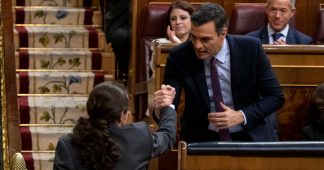By Catarina Martins
20 April 2021
Back in 2017, you spoke to NLR about the confidence and supply agreement between the Bloco de Esquerda and the Socialist Party (PS). This arrangement enabled Portugal to roll back some of the austerity measures introduced after the crash, including pension freezes and cuts to social security. Yet there were disagreements with the PS over public spending, Portugal’s relationship with Europe, and the need for deeper structural reforms. How did these tensions play out over the following years?
After it formed a minority government in 2015, the PS adopted some measures that improved workers’ incomes, but it would not accept meaningful changes to public services or democratic control over strategic sectors of the economy. So we were able to reverse the Troika’s major cuts, yet once we began discussing how to properly rebuild our social infrastructure – healthcare, welfare, workers’ rights – well, things got much more complicated. One of the main sticking points was the PS’s refusal to consider any reform to labour laws. Now, with the pandemic, we can clearly see the effect of that refusal, because we have a large number of precarious workers with no recourse to unemployment benefits or other social protections. Many workers who have lost their jobs because of Covid-19 don’t even appear on the official unemployment statistics, so they’re simply left without an income.
It is crucial to understand that, at this point, the PS does not even pretend to have a political project of its own. It sees its role as managing Portugal’s everyday affairs in line with the expectations of the EU. When the Bloco had an agreement with the PS we tried to offer a more transformative vision; but António Costa would not go beyond repealing the austerity measures of the previous government. This made it a constant struggle to keep our agreement alive.
What changed?
During the 2019 election campaign, the PS said that they could no longer be constrained by the Bloco and the Communists; they wanted a ‘free hand’. So now they build legislative majorities on a case-by-case basis, sometimes negotiating with the left, sometimes with the right. This puts us in a very difficult position. On specific issues, we are not unwilling to vote with the government, but we will not do so just for the sake of supporting it. We must agree on a direction for our country. This is problematic, though, since the PS has no clear direction!
That, in a nutshell, is where we are now. Portugal still needs structural change which Costa is unwilling to consider. He justifies this refusal by invoking the threat of ‘imminent crisis’. Because he doesn’t have a majority in parliament, he constantly raises the prospect of a political meltdown which could usher in a conservative government, led by the Social Democrats and propped up by the far-right. Even though all the polls say that the right-wing parties do not enjoy this level of support, Costa uses this possibility to blackmail the left and prevent any discussion of alternative economic strategies. So long as we are trying to stave off an immediate political crisis, we are not discussing broader social questions.
In the Bloco, we have said that we are open to another agreement with the PS if it meets certain conditions: changing labour laws, strengthening the national healthcare system, giving contracts to health workers and boosting the welfare system to ensure everyone has the support they need during the pandemic. We have a minimum proposal that is always on the table. But I don’t think the Socialist Party will agree to any of it: they would only ever accept the minimum of the minimum during the last parliament.
How did the Bloco fare in the elections of October 2019?
We maintained the position we had in 2015: we were the third party, with about 10% of the vote and 19 members elected to parliament.
You voted against the last Costa budget, whereas the Communist Party came to some kind of agreement with the PS, which is what gave them a majority. What concessions did the Communists get?
They didn’t get many concessions. The PS agreed to go a little bit further with some of the social measures for workers whose jobs had been affected by the pandemic. But the support they offered was so minimal, and so uneven, that this barely mattered. Workers in sectors like tourism and culture are still deprived of basic rights, and the government’s €50 monthly pandemic payments are almost meaningless considering the cost of living. So I believe the agreement with the Communists was mostly symbolic. The PS also agreed in principle to increase investment in the national healthcare system – but this pledge had already been made in the last two budgets and never came to pass, so it’s unlikely that it will happen this time.
One must also remember that the Communist Party lost a significant number of votes at the last election, and can only avoid another one by propping up the PS. Their base is relatively old, so it naturally declines as time goes by. And much of their support is drawn from the unions, which have lost touch with younger generations of workers by failing to understand problems of precarious employment or develop new organizing methods. This has led to a decline in union membership, with knock-on effects for the Communists’ popularity. Before they can rebuild their support, they will do their best to avoid facing the electorate. And I think that as long as the Communist Party wants to avoid elections, we won’t have elections.
Portugal has been hit hard by the pandemic in recent months. In late January, its death and infection rates were the highest in the world. Has the government faced substantial criticism for this?
Yes it has. During the first wave, Portugal had one of the best records in Europe for controlling the virus. It started late here, so we had seen what happened in Italy, Spain and Britain, and were already expecting an outbreak. When it arrived people stayed at home, followed the restrictions, and cases started to drop off. But then, during the second wave, we never managed to get the numbers down – partly because we were one of the first EU countries to have more transmissible variants. The Bloco spent weeks calling for various precautionary measures – mass testing, fewer students in classrooms, more teachers, additional staff to help maintain social distancing, improvements to public transport where buses and trains were still crammed with commuters every morning. But the PS didn’t do any of this. They believed that since we’d done well in the first wave, it would be the same for the second. In the event, the government had simply lost control.
Has the Costa government passed any significant new legislation since it was re-elected in 2019?
Not really. They have allied with the so-called Social Democrats, in reality Conservatives, to give more power to city mayors, who can now elect the officials responsible for managing EU funding – which means that, as usual, the two big parties will define the investments, and redouble the public financing of private companies. They’ve also made it more difficult to run for mayoral positions, and they’ve shut down debates in the parliament. We used to debate with the prime minister every two weeks; now we do so every two months. So there have been these small anti-democratic reforms. But we’ve had no major budgetary changes so far.
Both the 2019 parliamentary election and the 2021 presidential ballot had astonishingly low turnout rates: 48% and 39% respectively. What accounts for these figures?
Well, first of all, our voting system is different to that of other countries, because everyone is automatically placed on the electoral list. Even citizens that have lived outside of Portugal for many years are not required to register. And since so much of our population lives abroad, this inevitably lowers the turnout, proportionate to the percentage of registered voters.
In the years after the Revolution, participation rates were higher. People felt they had a stake in the society that was being built. The idea of popular sovereignty was hugely important. But that began to change when the two-party system was consolidated, and many people realized there was not much difference between the Socialists and Social Democrats. On top of this, the EU has spent decades telling us that we cannot decide our own policies. We cannot increase social spending; we cannot nationalize our electricity system or our airports. When the scope of political decision-making is that restricted, people don’t see the point of elections – and you can’t blame them.
There is a big discrepancy between the vote that the PS gets in national elections, and its seats in parliament. In 2019, with 36 per cent of the vote the party took 47 per cent of deputies – a huge difference, due to the D’Hondt version of PR apportionment. Is there any significant movement for electoral reform in Portugal?
In the Azores, there is one full district of all the islands that compensates those who don’t elect anyone from the particular islands themselves, which makes the Azores assembly more balanced than any other in the country. But all the media pressure is to reduce, not increase proportionality in the national parliament, in the direction of creating just a two-party system of the PS and PSD.
It seems a bit strange that there is no demand for a system like the genuinely fair German model. Shouldn’t that be respectable enough – after all it was Germany under Social-Democratic rule in the 70’s that helped advise and finance the victory of the PSOE in 1976?
That’s not discussed here. The debate in Portugal centres on single-member constituencies, which would just consolidate the power of the PS and the PSD in a two-party system.
Is there a generational division in voter turnout?
Yes, as in most countries, the figures for younger generations are lower. But people aged fifteen, sixteen, seventeen – those who are still too young to vote – are perhaps one of the most politicized cohorts Portugal has ever seen. We recently had a disappointing outcome in the presidential election, with the incredibly low turnout that you mentioned. But immediately after it, we had lots of new members joining the Bloco, 70% of whom were under twenty. This is something completely new. It’s the same generation that has organized the school climate strikes; the same one that’s been deeply involved in feminist and anti-racist movements. These activists are a still minority within their generation. But five years ago we didn’t even have this minority. So there is real hope for how they will reshape politics.
Has the Bloco been directly involved in these youth-led social movements?
Yes we have. In cities like Lisbon these movements have attracted huge numbers of people. Thousands turned out in the capital for a series of Black Lives Matter demonstrations last summer. In smaller villages in the interior we haven’t seen as much activity. But thanks to social media even a kid living in a rural town can connect with activists on the other side of the country. This makes it easier for the Bloco to reach that newly politicized generation. I don’t know how that will develop, but it’s very striking.
How do you assess the emergence of the far-right Chega and its leader André Ventura? Was his showing in the presidential election just a protest vote, or does it speak to a real upsurge?
There has been a real change on the Portuguese right. The regions where Chega picks up the most votes are some of the most deprived in the country. In Alentejo, or on the outskirts of Lisbon, you have an ageing population, poor working conditions and low expectations. I don’t believe the far-right is now mainstream, but it has the potential to become so, especially if people feel abandoned during the pandemic. That’s a risk the left should take seriously. In recent years the Christian CDS has almost disappeared, and Ventura has performed best in the places where it was once popular. This constituency – of about half a million people – has always had racist views. But with the rise of Chega, their xenophobia has been legitimized. It has gone from implicit to explicit.
One last question. Would it be right to think that, because of the pandemic and the lockdown restrictions, the kinds of collective action that were characteristic of the Bloco in the past have become very difficult?
Yes, collective action and other forms of protest are difficult in the present circumstances. But something interesting has replaced them. For the first time in Portugal, we have a self-organized movement of unemployed people who are asserting their right to the social support that the PS has withheld from them. These groups are holding meetings, signing petitions, appearing on TV and so on. I organized an online meeting about this issue and, to my surprise, hundreds of people joined at short notice. So we decided to schedule similar meetings all over the country, expanding the discussion to include other kinds of precarious employment. This has led to labour organizing in sectors that had never seen that kind of activity before. Of course, one needs to be cautious because these are still small and tentative steps. But we believe it is the Bloco’s responsibility to help these new forms of self-organization. It is still too soon to predict the effect of the pandemic on the political situation. In the short-term, people tend to want stability and continuity above all else. But the social crisis will also undoubtedly have an impact, which could open up the space to discuss alternative models of society. The left must be ready to create that opportunity.
Published at newleftreview.org











